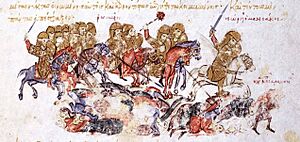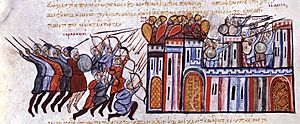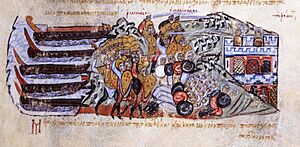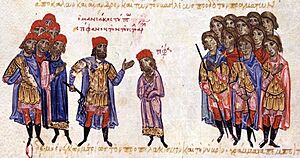George Maniakes facts for kids
Quick facts for kids
George Maniakes
|
|
|---|---|
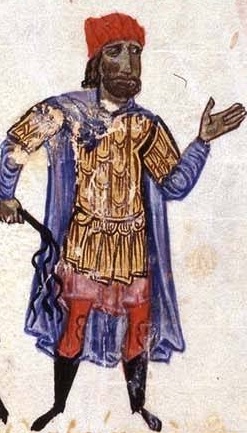 |
|
| Born | c. 998 Macedonia |
| Died | 1043 (aged 44–45) Near lake Vegoritida, west of Thessaloniki |
| Allegiance | Byzantine Empire |
George Maniakes (also known as Georgios Maniaces) was a very important general in the Byzantine Empire during the 1000s. He was the governor of Italy in 1042. People also called him Gyrgir in old Scandinavian stories. He was known for being very tall and strong, almost like a giant.
A Great General's Life
George Maniakes was a Greek general. He first became famous around 1030. His army lost a battle near Aleppo, but he then successfully captured the city of Edessa from the Arabs.
Taking Back Sicily
His biggest success was taking back parts of Sicily from the Arabs. This started in 1038. He got help from the Varangian Guard, a group of elite soldiers. This group was led by Harald Hardrada, who later became the King of Norway.
Maniakes also had Norman fighters helping him. These Normans were led by William de Hauteville. William earned his nickname "Iron Arm" because he beat the leader of Syracuse in a one-on-one fight.
However, Maniakes soon had problems with his own team. He upset his admiral, Stephen. Stephen's wife was the sister of John the Eunuch, a very powerful person in the emperor's court. Maniakes also publicly shamed Arduin, who led the Lombard fighters. Because of this, the Lombards, Normans, and Norsemen left his army.
The emperor, Michael IV, then called Maniakes back. Emperor Michael IV was also Stephen's brother-in-law. Even though the Arabs soon took Sicily back, Maniakes' victories there later inspired the Normans to invade Sicily themselves.
The Revolt and Death
The emperor largely ignored Maniakes' achievements in Sicily. In 1042, Maniakes was made governor of Italy. But he still rebelled against Emperor Constantine IX.
A man named Romanus Sclerus was a big reason for Maniakes' revolt. Sclerus was a very rich landowner, just like Maniakes. Their lands were next to each other, and they were rumored to have fought over land. Sclerus had influence with the emperor because his charming sister, Maria Skleraina, was close to Constantine. Sclerus used his power to turn Emperor Constantine against Maniakes.
When Sclerus demanded that Maniakes give up command of the army in Italy, Maniakes had Sclerus brutally killed. Maniakes' soldiers, including the Varangians, then declared him emperor. He marched his army towards Constantinople, the capital city.
In 1043, Maniakes' army fought against the emperor's troops near Thessalonica. Maniakes' army was doing well at first, but Maniakes was killed in the fight after getting a fatal wound. His death ended the rebellion.
As a punishment, Emperor Constantine made the surviving rebels ride backwards on donkeys in the hippodrome. Today, the town of Maniace in Sicily and the fortress Castello Maniace are named after him.


